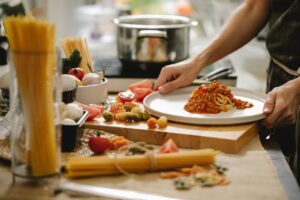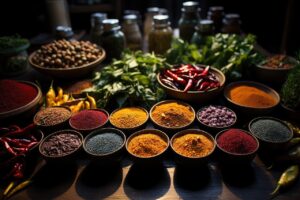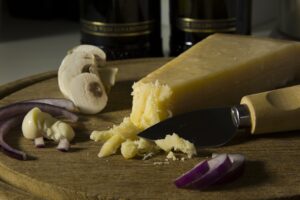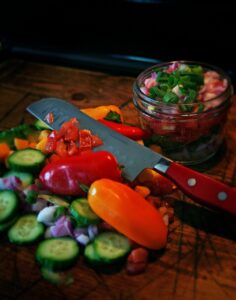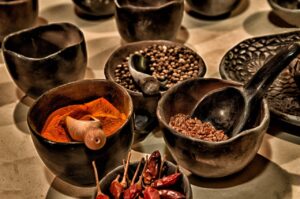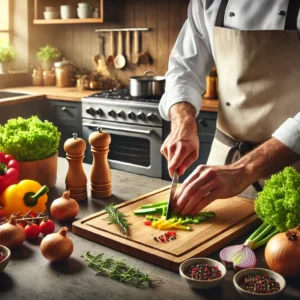Mastering the art of cooking can seem daunting, especially for beginners.
Yet, with the right guidance and practice, anyone can become proficient in the kitchen.
This article aims to be your comprehensive guide to mastering basic cooking techniques at home. It’s designed to help you navigate the culinary world with ease and confidence.
From understanding fundamental cooking methods to learning essential kitchen hacks, we’ve got you covered.
Whether you’re a novice cook or an experienced home chef looking to refine your skills, this guide offers valuable insights.
The Importance of Basic Cooking Techniques
Understanding basic cooking techniques is the foundation of any culinary journey.
These techniques not only enhance your kitchen skills but also boost your confidence in preparing a variety of dishes. They allow you to experiment with recipes, create balanced flavors, and ensure food safety.
Moreover, mastering these techniques can make your cooking process more efficient and enjoyable.
So, whether you’re aiming to impress your guests with a gourmet meal or simply want to prepare healthier, tastier meals for your family, learning these techniques is a step in the right direction.
Fundamental Cooking Methods Explained
Cooking methods can be broadly categorized into two types: dry heat and moist heat.
Dry heat methods, such as sautéing, grilling, roasting, and baking, involve cooking food in the absence of water. These methods often result in a browned, flavorful crust on the food.
Moist heat methods, like boiling and steaming, involve cooking food in water or steam. These methods are often used for foods that need to be tenderized, like tough cuts of meat or hard vegetables.
Understanding these methods and when to use them can greatly improve your cooking outcomes.
Boiling and Steaming
Boiling involves immersing food in a liquid, usually water, that’s heated to its boiling point. It’s a quick and easy method, ideal for cooking pasta, eggs, and vegetables.
Steaming, on the other hand, cooks food by exposing it to steam. It’s a gentle cooking method that preserves the nutrients, color, and flavor of the food, making it perfect for delicate items like fish and vegetables.
Sautéing and Grilling
Sautéing is a quick, high-heat cooking method that involves cooking food in a small amount of fat. It’s great for cooking vegetables, meat, and seafood, as it seals in the flavors and creates a nice, browned exterior.
Grilling involves cooking food on a grill over direct heat. It imparts a smoky flavor to the food and creates a caramelized crust, making it a popular method for cooking meats and vegetables.
Roasting and Baking
Roasting involves cooking food in an oven with dry heat. It’s a slow cooking method that’s ideal for large cuts of meat and whole vegetables, as it brings out their natural flavors and creates a crispy exterior.
Baking, while similar to roasting, is typically used for bread, pastries, and desserts. It’s a method that requires precise temperature control and timing for the best results.
Knife Skills: Safety and Efficiency
Good knife skills are a cornerstone of cooking. They not only speed up your prep time but also ensure the safety and efficiency of your cooking process.
Knowing how to properly hold a knife, how to cut different types of food, and how to maintain your knives can make a significant difference in your cooking. It can also help you achieve more consistent results, as uniform pieces of food cook at the same rate.
Remember, a sharp knife is safer than a dull one, as it requires less force to cut through food, reducing the risk of accidents.
Selecting the Right Cookware
The right cookware can greatly influence the outcome of your dishes. Different materials conduct heat differently, affecting how your food cooks.
For instance, stainless steel pans are great for browning and making pan sauces, while non-stick pans are ideal for cooking delicate foods like eggs and fish.
Heat Management and Control
Managing heat is a crucial part of cooking. It’s not just about high or low heat, but understanding when and how to use them.
For example, searing meat requires high heat to create a flavorful crust, while simmering a soup needs low, steady heat. Mastering heat control can significantly improve your cooking results.
Seasoning: The Secret to Flavorful Dishes
Seasoning is more than just adding salt and pepper. It’s about enhancing the natural flavors of your ingredients and creating a balance in your dish.
Understanding how to use herbs, spices, acids, and sweeteners can transform your cooking. For instance, a squeeze of lemon can brighten a dish, while a pinch of sugar can mellow out acidity.
Remember, the key to seasoning is to taste as you go. This way, you can adjust the flavors to your liking and ensure a delicious result every time.
Mise en Place: Organizing Your Cooking
“Mise en place” is a French term that translates to “everything in its place”. It’s a cooking technique that involves preparing and organizing all your ingredients before you start cooking.
This method not only saves time but also reduces stress during the cooking process. By having everything ready at your fingertips, you can focus on the actual cooking and ensure a smoother workflow.
Time-Saving Cooking Hacks
Cooking hacks can make your time in the kitchen more efficient. For instance, using a microplane to grate garlic and ginger directly into your pan saves time and minimizes cleanup.
Another hack is to use a pizza cutter to quickly chop herbs or greens. These simple tricks can significantly reduce your prep time and make cooking more enjoyable.
Reading and Following Recipes Correctly
Understanding how to read and follow a recipe is a crucial cooking skill. It’s important to read the entire recipe before starting to ensure you have all the necessary ingredients and understand the steps.
Remember, recipes are guides, not strict rules. Feel free to adjust to your taste, but keep in mind that baking requires more precision due to its scientific nature.











